|
|
Post by africurious on Dec 23, 2018 23:06:08 GMT -5
WTH? Jim Crow was good for blacks?!! Hahaha! Oh I guess like how slavery was good for them and taught them manners and how to not be lazy like southern whites said.
Jim Crow and segregation aren’t even the same thing. Jim Crow is whole bunch of laws that were passed in the south after reconstruction to remove the black man from any power he had in the south. This included laws to prevent blacks from voting and to lock them up to use them for free labor so that slavery continued under a different name. And blacks were segregated so they could be put in conditions below that of whites. But ya Jim Crow was good for blacks. Guess that’s why so many blacks tried to escape Jim Crow in the south and head north for more than half a century. They didn’t know what was good for them.
This Asante dude is sharp. Jim Crow started in 1878 and was supposedly good for blacks yet only around 1950 did the supposed economic boon from Jim Crow help blacks?
|
|
|
|
Post by zarahan on Dec 23, 2018 23:27:51 GMT -5
Al-Takuri says:
I thought everybody knew negroes were getting their heads busted trying to buy an integrated cups of coffee at lunchcounters. Uhn huhn, because the whites wanted their money right.
Better talk to Black businesses people who lost clientele and eventually shuttered after negroes could force whites to take their $$$.
Hotels, motels, beach houses, restaurants, etc., fell to the wayside as negroes refused to patronize blacks who had always been there.
Experience trumps armchair scholarship by those who weren't there and were never involved.
It's a sad fact Black Americans will not Buy Black or Buy Where You Work. That's why FOB immigrants setup in 'Hoods grabbing up beaucoop $$$ that used to circulate and recirculate in Black hands before gov enforced integration.
Get out the books
Get out on the street
I used to be a street & cultural event vendor.
Ask me why my mini-mart grocery store failed.
Yes, there were losses. But the trade-off, was overall, beneficial for blacks.
That is why today we have multi-million dollar black businesses, and skilled
blacks can actually get paid what white people are getting paid, rather than
chump-change in segregated venues.
Furthermore the much touted golden age of business under Jim Crow was never the
rosy picture so often painted. It was an age with the worse locations, discriminatory
financing, biased contract enforcement, open employment discrimination etc etc
that suppressed black income and business opportunities. In addition, during
the golden age, it was a struggle to get black people to buy black in several categories
of product, and service. It was not always lack of race loyalty. In some cases the
products and services of black businessmen were markedly inferior. Jackie Robinson
continually fumed at the dual track inferiority system- he and his black teammates
were routed to second-tier dumps or crowded accommodation on the black side of town,
while white teammates were staying in plush hotels- even as Jackie made his team thousands in
profit. What golden age is there to celebrate in that? Black consumers wanted better
and their rising incomes in the 19650s, and even more in the 1960s meant that they
would no longer be content with the second-hand trickle down of the Jim Crow framework.
That's not book theory, that's what happened in the real world.
On top of the above is the general decline of the mop and pop enterprise due to
automation, cheap imports from overseas, and the rise of big corporate chains.
The old downtown lunch counters of the famous sit-ins for example were already on
their way out as corporatism took over, and the mass populace shifted to suburbia.
My grandfather made his living as a shoemaker on into the 1950s. But by the 1970s,
his trade was gone. My other grandfather used to do blacksmithing. That trade too vanished.
Again, that is not theory, that is what happened in the real world. The rosy picture
painted of a blissful business nirvana back in the Jim Crow day is too often unrealistic,
and does not reflect what actually happened on the ground.
|
|
|
|
Post by zarahan on Dec 23, 2018 23:42:14 GMT -5
I thought everybody knew negroes were getting their heads busted trying to buy an integrated cups of coffee at lunchcounters. Uhn huhn, because the whites wanted their money right.
But whites did want black money, once black folk began to build up their cash reserves.
They wanted to maintain the social inferiority and white supremacy of Jim Crow, but
they had no problem taking black money. How do you think black people got land in the
south? Even the most racist whites saw that they could make some dough by selling ff
a portion of their lands that were just sitting, unused and unproductive. How do
you think Harlem became black? By singing "Old Black Joe" for de white folks? NO.
It became black because white people wanted to make money, and they got premium dolla
from blacks who needed housing. Why do you think that many stores STILL took black money
even as they refused to let blacks sit next to de white folk at their lunch counters?
THey sure as hell did not turn down the black dollars from the black shoppers who spent
on clothing, groceries, appliances and sundries. And this is precisely the point stressed
by the Civil Rights Movement activists. We buy at your stores, and as a result we deserve
decent equal treatment. We ain't asking for anything extra. All this is pretty basic
history 101 anyone should understand. White people never had a problem taking black money,
on their own terms.
|
|
|
|
Post by zarahan on Dec 24, 2018 0:02:15 GMT -5
WTH? Jim Crow was good for blacks?!! Hahaha! Oh I guess like how slavery was good for them and taught them manners and how to not be lazy like southern whites said. Jim Crow and segregation aren’t even the same thing. Jim Crow is whole bunch of laws that were passed in the south after reconstruction to remove the black man from any power he had in the south. This included laws to prevent blacks from voting and to lock them up to use them for free labor so that slavery continued under a different name. And blacks were segregated so they could be put in conditions below that of whites. But ya Jim Crow was good for blacks. Guess that’s why so many blacks tried to escape Jim Crow in the south and head north for more than half a century. They didn’t know what was good for them. This Asante dude is sharp. Jim Crow started in 1878 and was supposedly good for blacks yet only around 1950 did the supposed economic boon from Jim Crow help blacks? Unfortunately, on the web some painters of rosy pictures come perversely close to supporting the arguments of white racists that Jim Crow was "good for black people." Rather than argue more precisely, and qualify what they are saying, you get this golden age model that never existed in the real world, and the chilling implication of many golden age notions is that skilled black people should have stayed in little segregated check boxes, forever content with lesser opportunities and chump-change. Where would the great black athletes be for example if they had stayed in the shaky segregated leagues making chicken-feed, even as lesser talented white athletes raked in the dough? Your distinction between Jim Crow and segregation is a good one, but could it not be said that the two were closely related? In the north the Jim Crow was not as open, or written on the law books, ut the bottom line was still the same? This Asante dude is sharp. Jim Crow started in 1878 and was supposedly good for blacks yet only around 1950 did the supposed economic boon from Jim Crow help blacks? Yeah, I wondered about this myself. And I wondered about this economic boom in the1950s under Jim Crow, when in fact the 1950s were a time when segregation was being OVERTURNED on multiple fronts- from bus transportation, to school desegregation, to the GI BIll allowing thousands of black veterans to go to college, to jobs and contracts opened up by lawsuits and pressure applied during WW2, etc etc.. Scratch head.. |
|
|
|
Post by africurious on Dec 24, 2018 0:12:00 GMT -5
Let's look at some data and see the great conditions that existed among blacks before integration. Based on the data, blacks have been trending up socio-economically since at least the 60s. See below, source: www.pewsocialtrends.org/2016/06/27/1-demographic-trends-and-economic-well-being/st_2016-06-27_race-inequality-ch1-01/ 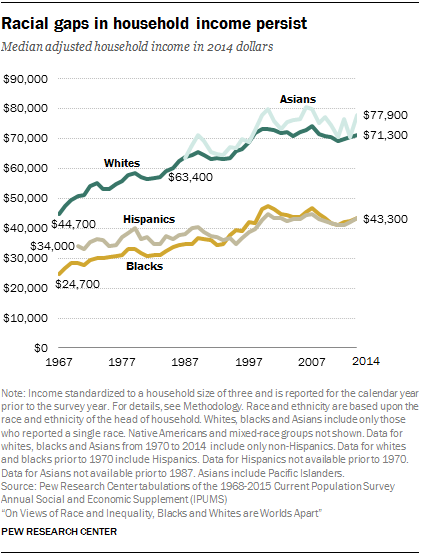 In '67 black incomes were 55% that of whites. By 2014 it was 61% that of whites. Meaning over 50yrs of ongoing integration black incomes rose quicker than those of whites and besides is much higher than it was previous to segregation. For data that goes back to '47, see this link: stateofworkingamerica.org/chart/swa-income-table-2-5-median-family-income/. Couldn't figure out how to embed the chart. But between 1947-2010 black incomes almost tripled!!! I guess there goes that myth of 1950 being so great. 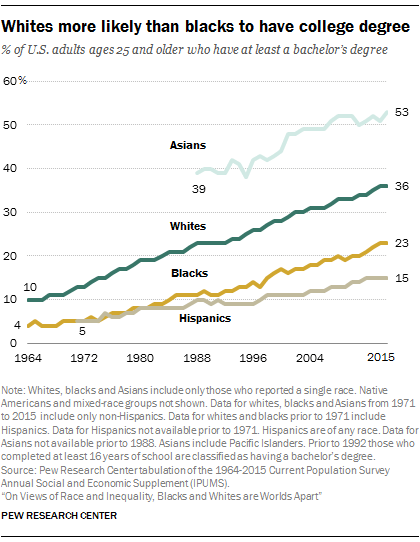 Look at the growth in blacks with college degrees. Yup, they were better off during jim crow and segragation. 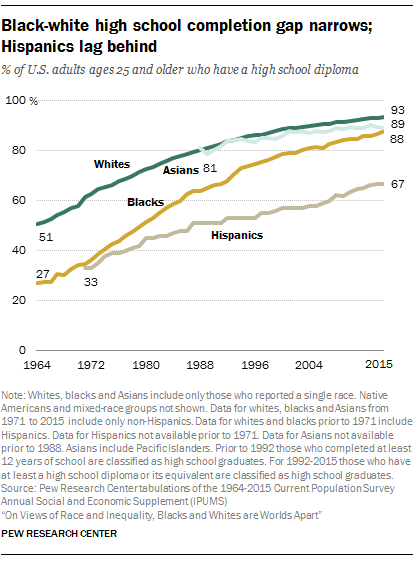 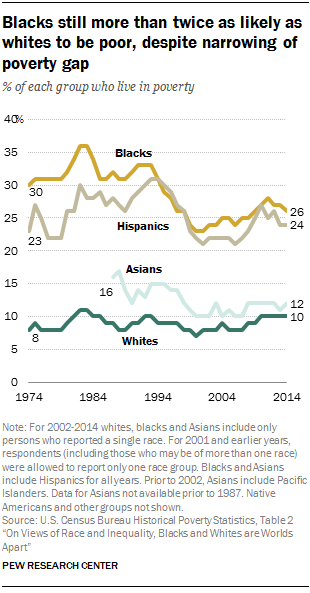 Notice the drop in rates of black poverty over several recent decades 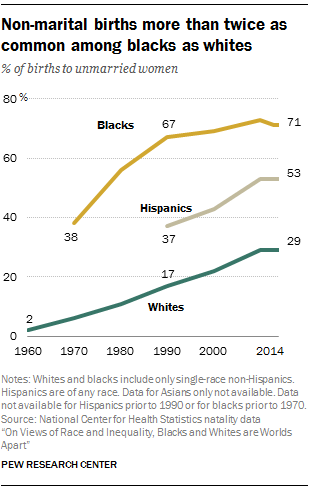 As is evident from the chart, non-marital births have risen the last several decades among virtually all ethno-racial groups in the US so it's not a "black" problem. And it's risen by an even higher degree among whites. But some ppl like to use racist spins of data when it suits their arguments but then claim everyone else is the dupe of the whiteman, smh. 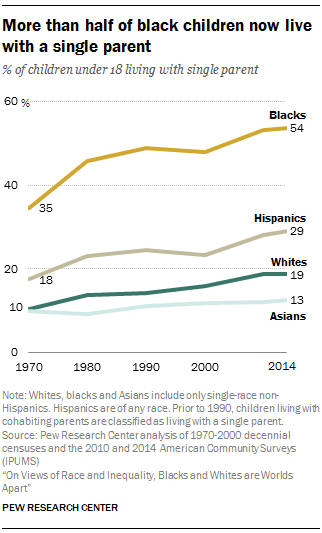 Notice there's a similar trend of increase for all ethno-racial groups when it comes to single parent households. 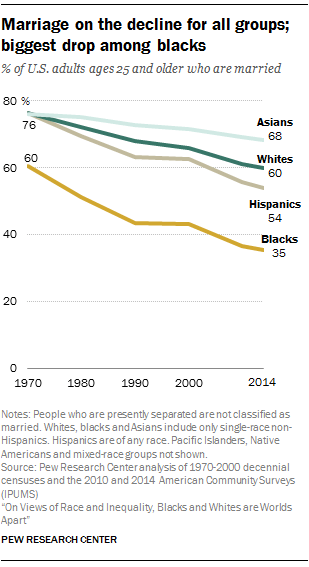 |
|
|
|
Post by africurious on Dec 24, 2018 0:17:37 GMT -5
I thought everybody knew negroes were getting their heads busted trying to buy an integrated cups of coffee at lunchcounters. Uhn huhn, because the whites wanted their money right.But whites did want black money, once black folk began to build up their cash reserves. They wanted to maintain the social inferiority and white supremacy of Jim Crow, but they had no problem taking black money. How do you think black people got land in the south? Even the most racist whites saw that they could make some dough by selling ff a portion of their lands that were just sitting, unused and unproductive. How do you think Harlem became black? By singing "Old Black Joe" for de white folks? NO. It became black because white people wanted to make money, and they got premium dolla from blacks who needed housing. Why do you think that many stores STILL took black money even as they refused to let blacks sit next to de white folk at their lunch counters? THey sure as hell did not turn down the black dollars from the black shoppers who spent on clothing, groceries, appliances and sundries. And this is precisely the point stressed by the Civil Rights Movement activists. We buy at your stores, and as a result we deserve decent equal treatment. We ain't asking for anything extra. All this is pretty basic history 101 anyone should understand. White people never had a problem taking black money, on their own terms. Yup. Whites still made lots of money from blacks during segregation. They still owned businesses and property in black neighborhoods and businesses that supplied black businesses during segregation. Segregation was just the means to keep blacks in substandard conditions and remind whites they were superior. |
|
|
|
Post by africurious on Dec 24, 2018 0:29:26 GMT -5
WTH? Jim Crow was good for blacks?!! Hahaha! Oh I guess like how slavery was good for them and taught them manners and how to not be lazy like southern whites said. Jim Crow and segregation aren’t even the same thing. Jim Crow is whole bunch of laws that were passed in the south after reconstruction to remove the black man from any power he had in the south. This included laws to prevent blacks from voting and to lock them up to use them for free labor so that slavery continued under a different name. And blacks were segregated so they could be put in conditions below that of whites. But ya Jim Crow was good for blacks. Guess that’s why so many blacks tried to escape Jim Crow in the south and head north for more than half a century. They didn’t know what was good for them. This Asante dude is sharp. Jim Crow started in 1878 and was supposedly good for blacks yet only around 1950 did the supposed economic boon from Jim Crow help blacks? Unfortunately, on the web some painters of rosy pictures come perversely close to supporting the arguments of white racists that Jim Crow was "good for black people." Rather than argue more precisely, and qualify what they are saying, you get this golden age model that never existed in the real world, and the chilling implication of many golden age notions is that skilled black people should have stayed in little segregated check boxes, forever content with lesser opportunities and chump-change. Where would the great black athletes be for example if they had stayed in the shaky segregated leagues making chicken-feed, even as lesser talented white athletes raked in the dough? Your distinction between Jim Crow and segregation is a good one, but could it not be said that the two were closely related? In the north the Jim Crow was not as open, or written on the law books, ut the bottom line was still the same? This Asante dude is sharp. Jim Crow started in 1878 and was supposedly good for blacks yet only around 1950 did the supposed economic boon from Jim Crow help blacks? Yeah, I wondered about this myself. And I wondered about this economic boom in the1950s under Jim Crow, when in fact the 1950s were a time when segregation was being OVERTURNED on multiple fronts- from bus transportation, to school desegregation, to the GI BIll allowing thousands of black veterans to go to college, to jobs and contracts opened up by lawsuits and pressure applied during WW2, etc etc.. Scratch head.. Yes Jim Crow and segregation are tied together in that segregation is part of Jim Crow. But Jim Crow is a specific and larger thing so we shouldn't lump the 2 together. Good point with the athletes. Some black ppl fail to realize that so many black businesses' growth was stunted or destroyed because of segregation. Any boom in the 1950s was the general post-war boom (which you pointed out) that affected all americans but whites more than any other. It had zero to do with segregation. In fact you can see this in the income jumps from '47-'69 that are in the chart from the link to the SWA website I posted. |
|
|
|
Post by zarahan on Dec 24, 2018 8:50:45 GMT -5
Yes, good points all, and your roundup of economic trends is good. I am not dissin
black business as such by the way. On page 5 of the thread, I repeat the following
statement 3 rimes in a row, just to be clear:
And No, I did NOT say there were not some prosperity under Jim Crow. SOme businesses made a valuable contribution/laid the foundation.
And No, I did NOT say there were not some prosperity under Jim Crow. SOme businesses made a valuable contribution/laid the foundation.
And No, I did NOT say there were not some prosperity under Jim Crow. SOme businesses made a valuable contribution/laid the foundation.
ALl I am saying is that we should not over-romanticize or glamorize the Jim Crow past
on this score as some people you run into seem to be doing. Many examples were given
above of the problems, but it is painful sometimes to read the bitterness of black
activists in the 1920s, 30s, 40s, trying to get black people to support their own,
or sometimes, trying to get black merchants to cooperate into a network that would boost
trade as well as pass on savings to black consumers. There were some successes, but there
were also several failures, that call into question some of this romanticism.
|
|
|
|
Post by Tukuler al~Takruri on Dec 24, 2018 9:22:26 GMT -5
Hey what can I say? If you didn't live through it don't interview those who did believe what you will. And a rosy Jim Crow era? Build a strawman knock him down. I bet you guys think Beatrice was proper Black business. Yeah, for integrationists. To the DO FOR SELF nation within a nation blacks it was the biggest blunder ever. As soon as whites were forced to accept their $$$ negroes turned away from Black businesses. If whites always wanted Black $$$ why were there Black businesses founded? Integrationist will always dump on internal nationalism of any kind. They place 'i got mine you got yours to get' over internal nation economics. That's why what would be like the 11th richest nation has a high rate of personal poverty and makes no jobs for itself. Every people make jobs for their own, except... ... finacially support Arab immigrants over their own people. www.amiba.net/resources/multiplier-effect/ |
|
|
|
Post by Tukuler al~Takruri on Dec 24, 2018 10:46:49 GMT -5
I agree integration ruined independent Black economy.
$$$ that circulated and recirculated in Black hands suddenly found itself in hands that didn't want it. Within a decade most Black businesses crumbled up and blew away. The exception being black quasi-internal nations like the NOI, Israelites (conglomeration of Caribbes, Yanks, and Continentals), Kawaida, and Caribbean communities. Miseducated negroes who unwittingly attained white privilege for south and east Euros and Jews, rushed to force whites to take their $$$.
Blacks themselves wrecked an internal economy that took paramilitary force to shutdown in 1921 Tulsa. |
|
|
|
Post by Tukuler al~Takruri on Dec 24, 2018 11:11:37 GMT -5
Black businesses people ... lost clientele and eventually shuttered after negroes could force whites to take their $$$. Hotels, motels, beach houses, restaurants, etc., fell to the wayside as negroes refused to patronize blacks who had always been there. ... It's a sad fact Black Americans will not Buy Black or Buy Where You Work. That's why FOB immigrants setup in 'Hoods grabbing up beaucoop $$$ that used to circulate and recirculate in Black hands before gov enforced integration. ... I used to be a street & cultural event vendor.
Ask me why my mini-mart grocery store failed.Inane strawmans were raised and non-sequitors have been posted but nobody asked about my vitals store Sold the business to Italians. It soared. |
|
|
|
Post by Tukuler al~Takruri on Dec 24, 2018 11:14:58 GMT -5
Black buying power increases, but circulation of dollar within community remains lowThe State of the African-American Consumer Report is the first of annual installments in a three-year alliance between Nielsen and the National Newspaper Publishers Association, showcases the buying and media habits and consumer trends of black Americans. The full report can be accessed at www.nielsen.com/us/en/ insights/reports-downloads/2011/state-of-the-african- american-consumer.html For more information on the African American Chamber of Commerce log onto: www.aaccv.org/Buying Power is not used as a measurement of wealth. It is defined as the total personal income an individual has available after taxes for spending on virtually everything that they buy. Source: Selig Center for Economic Growth. Cell Phones - Asian and Latinos also spend a good portion of their money on telecommunications, but black households still have the edge. Fashion - Blacks spent more on women and girls fashions than non-black consumers combined, and almost twice as much on footwear. Expenditure on men's gear was about the same compared to non-blacks combined. Groceries. Pensions and Social Security - Blacks spent 10 percent of their after-tax income on pension contributions in 2007. Transportation - Black Americans lavish 17 percent on automobile purchases and upkeep. Education. Source: "Black Buying Power: Showing You the Money" by Donna Johnson and Boyd Klingler www.ebonyjet.com/living/money/blackbuying.aspx
Birdie Ross-Haith grew up patronizing black-owned businesses.
A native Victorian, Ross-Haith said her parents emphasized to her and her siblings the importance of supporting the black community by purchasing products and services from people who looked like them.
As an adult with a business of her own, however, Ross-Haith said that mind-set has seemingly fallen by the wayside.
"That's what's wrong with the black culture now. They don't try to help each other," said Ross-Haith, co-owner of B&B Handbags. "(Black shoppers) would come and look but never buy."Ross-Haith's statements come on the heels of recently released data that reports black buying power has increased from $957.3 billion in 2010 to an expected $1.1 trillion by 2015. Although this data from the State of the African-American Consumer Report reflects a positive growth in blacks' disposable income, the growing failure of blacks to do significant business with other blacks casts a dark shadow over the news.
Money circulates zero to one time within the black community,
compared to the more than six times it circulates in the Latino community,
nine times in the Asian community and
unlimited amount of times within the white community, according to the University of Georgia's Selig Center for Economic Growth. NUMBER OF BUSINESSES Between 2002 and 2007, the number of black-owned nonfarm U.S. businesses increased by 60.5 percent to 1.9 million, making these businesses one of the fastest growing segments of the economy, according to U.S. Census data. This is more than three times the national business ownership rate of 18 percent. Additionally, these black-owned firms employed 921,032 people, 0.8 percent of total employment, and generated $137.5 billion in receipts, 0.5 percent of all receipts, according to U.S. Census data. The growth of black-owned businesses in the Crossroads has not fared as well, though, said Matthew Gaskin, president of Victoria's African American Chamber of Commerce. Gaskin estimated the chamber is made up of at least 30 businesses, a figure that has remained stagnant the last couple of years. He estimated the chamber's membership peaked about 2009 with 50 businesses. A combination of business failure, owners moving from the area and owners deciding to leave the business have all attributed to the drop in membership.
|
|
|
|
Post by Tukuler al~Takruri on Dec 24, 2018 11:25:14 GMT -5
cont.
MONEY COMES; MONEY GOES
A community's health directly correlates to how many times money circulates or recycles within that community, Jim Wyatt told listeners during a recent African-American chamber membership drive.
"Much like the blood in your body, the more it circulates the healthier your body. The less it circulates the more problems your body will have," said Wyatt, chairman of the Texas Association of American Chambers of Commerce and former Victoria city councilman. "African-American businesses and consumers have a catch-22 so-to-speak."
Blacks make more shopping trips than all other groups, but spend less money per trip, according to The State of the African-American Consumer Report.
While blacks in higher income brackets spend 300 percent more in retail grocers than any other high income household, a much higher proportion of black consumers shop at convenience-oriented formats, such as drug, dollar and convenience/gas stores, according to the data.
Additionally, a greater percentage of blacks spend more for consumer products than other ethnic groups. They lead in the purchase of entertainment, electronic equipment and a host of other consumer products including hair care, on which they spend a reported $7.8 billion annually.
Most of these purchases are made from retailers outside of the black community.
"This $1.2 trillion that is coming into our community is going right back out. Very little of it is staying," said La Mancha Sims, co-founder of Triton Business Solutions, a small business development consulting firm headquartered in Atlanta, Ga. "If it flows in one pocket and out the other, we're going to be in the same position in 2020 or 2030."
Seth Forman, professor of public policy at Stony Brook University and author of the book "American Obsession: Race and Conflict in the Age of Obama" encourages more blacks to go into business for themselves to help further circulate the black dollar within their community.
"Because blacks were systematically prevented from owning property and commercial enterprises for several centuries, blacks are more likely than whites to prefer an activist government, and are more likely to look skeptically upon free-market competition, entrepreneurship and individualism," said Forman.
Sims said the circulation of money within the black community can also increase by mandating that businesses located within communities with a large black population give back to the community instead of taking all their proceeds elsewhere.
"They understand that," said Sims, 42. "We don't demand they do it."
|
|
|
|
Post by Tukuler al~Takruri on Dec 24, 2018 11:28:30 GMT -5
cont.
IMPORTANCE OF BUYING POWER
With a buying power of nearly $1 trillion annually, if blacks were a geographical-fiscal entity, they'd be the 16th largest country in the world.
The latest hike in black buying power is not the first significant growth this community has seen.
Blacks' buying power rose 166 percent in 17 years, from $318 billion in 1990 to $845 billion in 2007, according to the University of Georgia's Selig Center for Economic Growth.
Black-expected buying power exceeds that of Asians, $775.1 billion, but falls below that of Hispanics, $1.3 trillion, and whites, $11.8 trillion.
The gains in black buying power reflect more than just population growth and consumer inflation, according to the Selig Center report.
The number of African-American households earning $75,000 or more grew by almost 64 percent, a rate close to 12 percent greater than the change in the overall population's earning between 2000 and 2009.
This continued growth in affluence, social influence and household income all contribute to the black community's growing economic power, according to the Selig Center report.
|
|
|
|
Post by Tukuler al~Takruri on Dec 24, 2018 11:36:46 GMT -5
concl.
'SUGAR SWEETER THAN OURS'
"It's that mind-set that their sugar is a little sweeter than ours," said Sims, who spoke about the reluctance of some blacks to do business with other blacks.
Negative stigmas about black businesses being too pricey or offering service that is inferior and sub-par to non-blacks has permeated the black business community.
Valerie Reed, a 44-year-old sociologist and president and chief formulator of Valana Minerals, said the mind-set carries over from the days of segregation and slavery.
"In American culture, Caucasian-European culture is still seen as the ideal in so many ways," said Reed. "Social status level allows us to interact with the dominant group."
Reed said when a black business owner does something considered wrong, the thought is it happened because they are black, but that sort of reasoning is not done with other groups.
For the past eight years, Ross-Haith said she and her partner have sold their products at both private and trade shows.
Many times, black customers would stop by their booth and purchase nothing before proceeding on to a booth owned by a non-black proprietor and purchasing the exact same product sometimes at a higher price.
"We don't let it bother us," she said. "I've noticed we're just not as close as I feel we can be."
Out of their estimated 70 customers a month, she said only six or seven are black.
Wyatt said he implores blacks to give businesses within their community a fair chance.
"You go to Chili's and have bad service, but you go back. You go to Mumphord's and get bad service, and you never go back," Wyatt said. "We have to learn how to do business with each other and spend money with each other."
THE SOLUTION
"We are consuming all of our income," said Wyatt. "We need to be able to generate wealth to pass down to the next generation."
Wyatt said this starts with blacks starting to invest in the community.
"I'm not saying if you make a $100 to put it all back into the black community, but let's start with $10 and see what kind of difference that makes," he said.
More investments in non-disposable goods, life insurance and other items that build equity, said Sims.
A stronger financial education among the community is also necessary, experts said.
"They categorize a lot of African-American students as being uninterested or incapable of working not to produce entrepreneurship," Forman said about universities and colleges that push black students toward degrees in black studies and social sciences. "Under the guise of diversity, they ill-equip many minority students."
Experts remain optimistic about the future financial health of the black community.
"Buying power is a great thing if you know how to use it and leverage it," said Sims.
"Now is the best time for us to impact our net worth as African-Americans."
by gplatenburg@vicad.com Reporter Nov 30, 2011 0
|
|